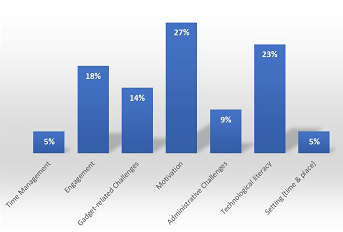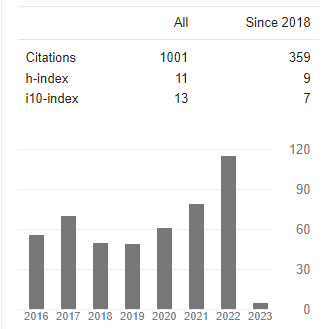An Investigation of the Major Challenges Encountered by Algerian EFL Teachers and their Impact on the Students’ Academic Performance during the Coronavirus Pandemic.
Abstract
Technology has given language instructors enormous opportunities to utilize online platforms to improve learners' language competence in difficult situations like the COVID-19 epidemic. This study attempted to investigate the challenges that Algerian EFL teachers and students experienced while using online teaching during the Coronavirus pandemic. In doing so, five (05) teachers and fifty (50) students from the English Language Branch at Mohamed Khider University of Biskra, Algeria participated in the study. A mixed-methods approach consisting of interviews and questionnaires was used to explore the teachers’ challenges in online education and their impact on students’ academic performance. This study focused on answering the following four questions : what are the major challenges encountered by Algerian EFL teachers in remote language teaching during Coronavirus pandemic? What is the impact of these challenges on students’ academic performance? What are the problems faced by EFL students? And is online language learning a real alternative to face-to-face education? The findings indicated that EFL teachers encountered several challenges such as time management, learners’ poor engagement and motivation, technological illiteracy and gadget-related issues. The findings also indicated that EFL students encountered other challenges such as the lack of variety in language learning materials, distraction at home, troubles with the Internet flow, the access to e-learning platforms, and they find remote learning tedious and monotonous due to the lack of interaction with their peers and teachers. Moreover, based on the data gathered from the tools employed in this study, the aforementioned challenges had a significant negative impact on the students’ academic performance; i.e., their language proficiency has decreased after the shift to distance language learning.
Downloads
References
Almosa, A. (2001). Use of Computer in Education, (2nd ed), Riyadh: Future Education Library and Higher Education, 5, 185-188.
Anita, Tamah, M., Gozali, I., Katarina Retno Triwidayati, Diah, S., & Jemadi, F. (2020). Secondary School Language Teachers’ Online Learning Engagement during the Covid-19 Pandemic in Indonesia. Journal of Information Technology Education: Research, 19, 803–832. https://www.informingscience.org/ Publications/4626
Clarke, T., & Hermens, A. (2001). Corporate developments and strategic alliances in e- learning. Education and Training, 43(4/5), 256-267.
Deejring, K. (2014). The design of web-based learning model using collaborative learning techniques and a scaffolding system to enhance learners’ competency in higher education. Procedia - Social and Behavioral Sciences, 116, 436 – 441.
Dhawan, S. (2020). Online Learning: A Panacea in the Time of COVID-19 Crisis. Journal of Educational Technology Systems, 49(1), 5–22. https://doi.org/10.1177/0047239520934018
Dolence, M. G., & Norris, D. M. (1995). Transforming higher education: A vision for learning in the 21st century. Ann Arbor, MI: Society for College and University Planning.
Gluchmanova, M. (2014). Application of e-learning in foreign language teaching at the technical university. Procedia - Social and Behavioral Sciences, 174, 3144 – 3149.
Harasim, L., Calvert, T., & Groeneboer, C. (1997). Virtual-U: A web-based system to support collaborative learning. Khan, 62, 149-158.
Khatoony, S., & Nezhadmehr, M. (2020). EFL teachers’ challenges in integration of technology for online classrooms during Coronavirus (COVID-19) pandemic in Iran. AJELP: Asian Journal of English Language and Pedagogy, 8, 1-16. https://doi.org/10.37134/ajelp. vol8.sp.1.2020
Porter, L.R. (2004). Developing an Online Curriculum: Technologies and Techniques. Hersey PA:Information Science Publishing.
Rosalina, E., Nasrullah, N., & Elyani, E. P. (2020). Teacher’s Challenges towards Online Learning inPandemic Era. LET: Linguistics, Literature and English Teaching Journal, 10(2), 71.
https://doi.org/10.18592/let.v10i2.4118
Sangrà, A., Vlachopoulos, D., & Cabrera, N. (2012). Building an Inclusive Definition of E-Learning: An Approach to the Conceptual Framework. International Review of Research in Open and Distance Learning. 13. 145-159. 10.19173/irrodlv13i2.1161.
Subekti, A. S. (2021). Covid-19-Triggered Online Learning Implementation: Pre-Service English Teachers’ Beliefs. Metathesis: Journal of English Language, Literature, and Teaching, 4(3), 232.
https://doi.org/10.31002/metathesis.v4i3.2591
Susilowati, R. (2020). The Challenges of Online Learning in Listening Class During Covid-19 Pandemic. Edukasi Lingua Sastra, 18(2), 56-72. https://doi.org/10.47637/elsa.v18i2.290
Tao, Y. H., Yeh, C. R., & Sun, S. I. (2006). Improving training needs assessment processes via the Internet: system design and qualitative study. Internet Research, 16 (4), 427–49.
Yunus, M., Ang, W. S., & Hashim, H. (2021). Factors Affecting Teaching English as a Second Language (TESL) Postgraduate Students’ Behavioural Intention for Online Learning during the COVID-19 Pandemic. Sustainability, 13(6), 3524. https://doi.org/10.3390/su13063524















